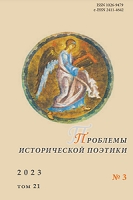Трагизм национальной истории и пути его преодоления в «Дворянском гнезде» И. С. Тургенева
The Tragedy of National History and Ways to Overcome it in Ivan Turgenev’s “A Nest of Gentry”
Author(s): Irina BelyaevaSubject(s): Russian Literature, Biblical studies, Theory of Literature, Sociology of Literature
Published by: Петрозаводский государственный университет
Keywords: I. S. Turgenev; Russian novel; A Nest of Gentry; tragic poetics; tragic collision; tragic conflict; tragic conception of national history; Lavretsky; Mikhalevich; biblical text;
Summary/Abstract: The article deals with Turgenev’s novel “A Nest of Gentry” and features of the artistic interpretation of tragic collisions in it. It is traditional- ly believed that the structure of the conflict in the writer’s novels is determined by a principle that goes back to ancient tragedy and that it was fully realized in “A Nest of Gentry.” The conviction in the tragic nature of the writer’s novels is also reinforced by the philosophical foundation of Turgenev, who gravitated toward a tragic understanding of being. The sharp transition from happiness to unhappiness, accompanied by the suffering of the characters and the in- evitable state of “tragic balance” in this situation, extended, as is commonly believed, both to the private and to the socio-historical spheres of the novel. As a result, “A Nest of Gentry” has a reputation as a work that testifies to the death of Russian nobility, the unproductiveness of the old ideals of the Lavret- sky generation and the dubiousness of the new truth that the hero finds in the ethics of Lisa Kalitina. The author of the article proposes to look at the tragic moods of “A Nest of Gentry” in a different way: through the prism of the perception of the novel by the first readers and critics, as well as in the light of the plot-compositional and ideological role played by the minor character Mikhalevich in it. Particular attention is paid to the XXV chapter of the novel, when Mikhalevich suddenly and, from the plot-compositional point of view, somewhat unmotivated (artificially) appears in front of Lavretsky and tells him that he remained the same (i.e., devoted to the ideals of youth), and ac- quired a new meaning life through faith in God. As a result, the paper pro- poses a different interpretation of the social program of the nobility proposed by Turgenev in the novel, and “A Nest of Gentry” is regarded as a text in which the tragic processes inherent in both ordinary life and national history are reflected by the writer in terms of possible rehabilitation and reconciliation, elegiac and dramatic. Turgenev offers his way out of the tragically uncompro- mising dead ends of social and national life, his social program, which would allow the nobility to change, but not lose their identity.
Journal: Проблемы исторической поэтики
- Issue Year: 21/2023
- Issue No: 3
- Page Range: 23-45
- Page Count: 23
- Language: Russian

